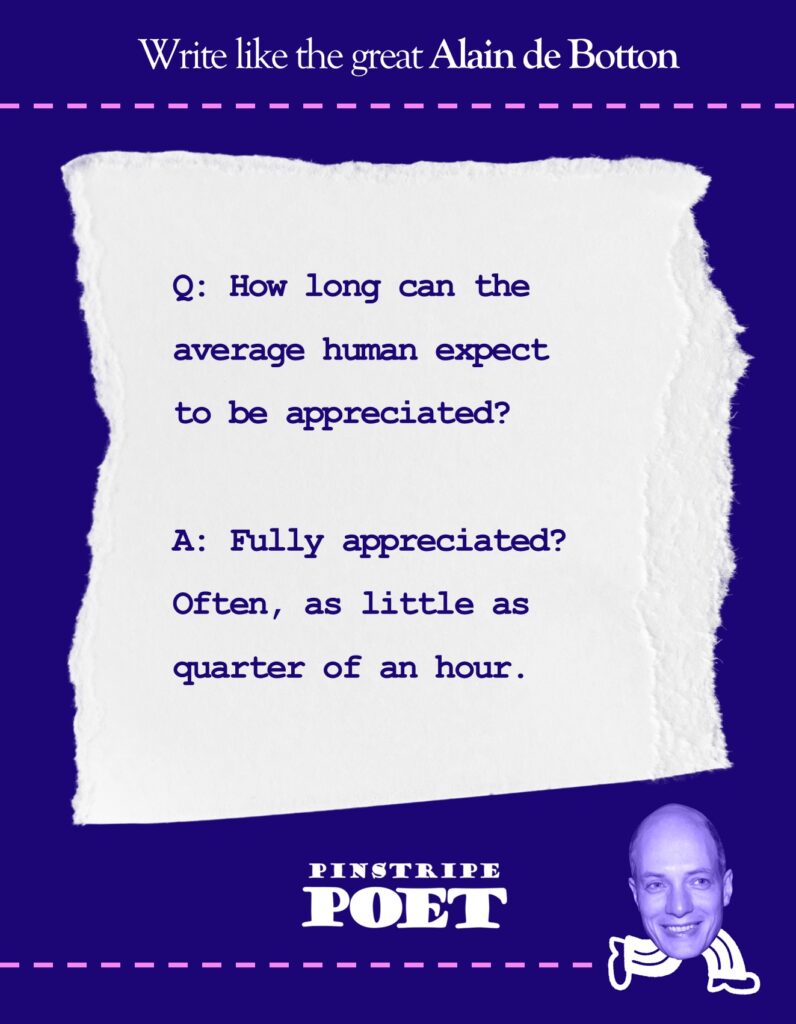
Every day, Alain de Botton refuses to touch his trust fund
It’s there. Presumably earning interest. But de Botton prefers to live off the sweat of his brow — his own intellectual capital — than rely on his family’s wealth.
The fact that philosophy has been good business for de Botton… Well, that’s beside the point.
Money didn’t bring satisfaction:
When I sold my first bestseller (and a million dollars was peanuts for my father) he was not impressed and wondered what I was going to do with myself.
The millions that are more exciting to Alain de Botton are the millions of readers, viewers and subscribers who follow his endeavours through The School of Life:
In a modest way, it’s an institution that is trying to give people what universities should I think always give them: a sense of direction and wisdom for their lives with the help of culture.
Where does the ambition come from?
How did it occur to de Botton to pipe philosophy to the masses over YouTube, instead of going the traditional route and wittering in dusty journals?
It all goes back to Proust — the French writer renowned for theories on time and memory — who also came to terms with a disappointed dad.
While baby Proust bounced on his mama’s knee, his father travelled across Europe, using his medical knowledge to stop the spread of cholera.
Proust dreamt of matching the patriarch-Proust’s achievements:
… if I could be sure of doing with my books as much as my father did for the sick.
Across the centuries, Alain de Botton heard the pain and urgency in Proust’s dream. He’d had a similar thought about celebrity do-gooders and gurus:
The nirvana would be if the questions raised by Oprah Winfrey [were] answered by the faculty at Harvard.
De Botton heeded Proust’s cry
He took the stuff of the Frenchman’s life — Proust’s biography and work — and presented it as a self-help guide.
How Proust Can Change Your Life is not a novel (it says as much on the cover). Chapter headings position the book as a practical tool:
How to Take Your Time
How to Suffer Successfully
How to Be a Good Friend
De Botton has a quietly radical belief: philosophy can and should provide answers that people can use in their daily lives.
And if the public can’t see the relevance of Proust’s 3,000-page musings, de Botton is ready to be their guide:
Civilisation should be about the transmission of the best ideas and we don’t seem to believe in transmission. We’ve no effective mechanism.
What could be an effective mechanism for transmitting ideas?
Clear, imaginative prose that delivers surprises alongside ideas.
De Botton’s book is broken up by curiosities: newspaper clippings; train timetables; psychological profiles; imaginary conversations; a short story about Virginia Woolf.
These are bribes for sceptical readers — people who’ll put up with philosophy as long as it entertains.
That’s most of us, it turns out. So we should be grateful to de Botton and his imaginative interpretations.
And if you’re wondering what de Botton’s secret is…
… how he can resuscitate moribund treaties from academic libraries and send ideas scampering into the street — it’s his sensitivity.
If you read The Guardian, you might have seen that ability in action. When de Botton wrote for the paper in 2005, he shared his response to a Hannah Starkey photograph — a display of hyper-sensitivity:
A few years ago, I fell in love with a girl in a photo, even though I couldn’t see her face, only her hair, which was a promise of happiness…
I imagined that I might join her at her table, that together we might watch the rain fall and be sad about everything, but happy that we had found each other to be sad with.

In How Proust Can Change Your Life, he seizes upon small, significant details that another scholar would miss — and enlarges them.
It comes naturally to de Botton. But it’s a gift. And he shares the richness of it widely.
Aidan Clifford writes for Pinstripe Poets – artists who love their day jobs. This post is part of a series called ‘Write like the Greats’. See the rest here.


